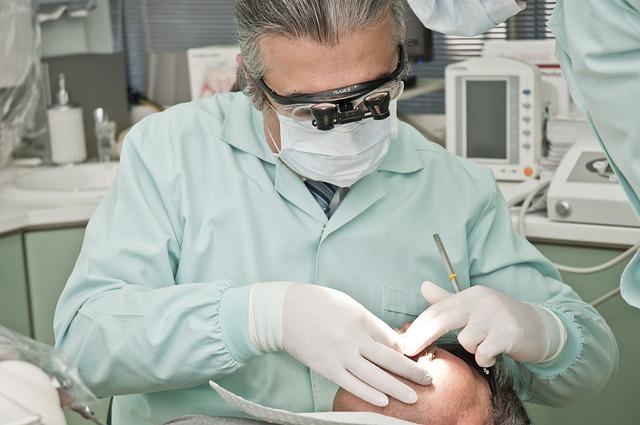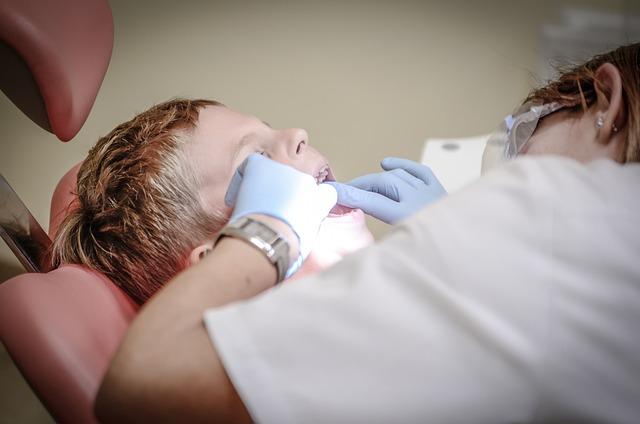Is Salt Good for the Teeth: Myths vs. Facts
When it comes to oral health, there are countless myths and misconceptions floating around, making it difficult to separate fact from fiction. One such topic that often sparks debate is the effect of salt on our teeth. Some claim that salt can be detrimental to dental health, while others believe it possesses beneficial properties. In this article, we will delve into the myths and facts surrounding salt and its impact on our pearly whites, providing you with a clear and confident understanding of the subject. So, buckle up and get ready to uncover the truth about whether salt is truly good for your teeth or not.
1. Debunking Common Myths: Unraveling the Truth about Salt and Dental Health
Myth 1: Salt is bad for your teeth
Contrary to popular belief, salt itself is not inherently bad for your dental health. In fact, salt can actually have several beneficial effects on your oral hygiene. Saltwater rinses, for example, can help to reduce inflammation and soothe gum tissues, promoting overall gum health. Additionally, salt has antimicrobial properties that can help eliminate harmful bacteria in the mouth.
Myth 2: Salt causes tooth decay
While excessive consumption of salt can contribute to health issues like high blood pressure or kidney problems, it does not directly cause tooth decay. The primary cause of cavities is the prolonged exposure of teeth to sugars and acids, which allows harmful bacteria to thrive. It’s essential to maintain good oral hygiene practices such as regular brushing, flossing, and dental check-ups to prevent tooth decay, regardless of salt consumption.
Myth 3: Salt whitens teeth
There is a common misconception that salt can be used as a natural teeth-whitening agent. However, salt alone cannot effectively whiten your teeth. While it may have a mild abrasive effect, it is not sufficient to remove deep stains or discoloration. Professional teeth whitening treatments or over-the-counter whitening products are more effective for achieving a brighter smile.

2. The Role of Salt in Dental Care: Separating Fact from Fiction
Salt has long been associated with various dental care practices, but there is often confusion surrounding its actual role. Let’s debunk some common myths and uncover the facts about salt’s impact on oral health.
Saltwater rinses: Many people believe that rinsing the mouth with saltwater can help alleviate toothaches or promote healing after dental procedures. While it may provide temporary relief due to its antibacterial properties, it is not a substitute for professional dental care. Saltwater rinses should be considered as a complementary practice to maintain oral hygiene, but they cannot replace regular brushing, flossing, and dental check-ups.
Salt as a tooth whitener: There is a widespread belief that using salt as a tooth whitener can enhance the brightness of your smile. However, this claim lacks scientific evidence. Abrasive substances like salt can actually damage tooth enamel, leading to increased tooth sensitivity and other dental problems. It is best to consult your dentist for safe and effective teeth whitening options.
Salt and gum health: Some individuals claim that salt can help treat gum disease or reduce gum inflammation. While salt’s antimicrobial properties may provide temporary relief, it cannot replace professional treatment. It is crucial to address gum issues with the guidance of a dentist or periodontist to prevent further complications.

3. The Surprising Benefits of Salt for Teeth: Insights from Dental Experts
When it comes to oral hygiene, most people are aware of the importance of brushing and flossing regularly. However, there is one surprising ingredient that dental experts recommend adding to your oral care routine: salt. Yes, you read that right – salt can actually benefit your teeth in several ways.
Here are some insights from dental experts on the surprising benefits of salt for teeth:
- Antibacterial properties: Salt has natural antibacterial properties that can help kill harmful bacteria in your mouth. This can reduce the risk of gum disease and cavities.
- Reduced inflammation: Saltwater rinses have been used for centuries to reduce inflammation and promote healing. Gargling with saltwater can soothe sore gums and speed up the healing process.
- Whitening effect: Salt can act as a natural teeth whitener. Mixing a pinch of salt with baking soda and brushing your teeth with the mixture can help remove surface stains and brighten your smile.
It’s important to note that while salt can have these benefits, it should be used in moderation and as part of a comprehensive oral care routine. Consult with your dentist to determine the best way to incorporate salt into your dental hygiene practices.

4. Understanding the Impact of Salt on Dental Enamel: What Science Reveals
What Science Reveals about the Impact of Salt on Dental Enamel
When it comes to maintaining healthy teeth, understanding the impact of salt on dental enamel is crucial. Scientific research has shed light on the effects of salt on our teeth, allowing us to make informed decisions about our dietary choices. Here are some key findings:
- Saliva’s protective role: Saliva plays a crucial role in protecting dental enamel from the harmful effects of salt. It contains minerals, such as calcium and phosphate, which help to remineralize and strengthen the enamel.
- Excessive salt consumption: Consuming excessive amounts of salt can lead to a higher risk of enamel erosion. The sodium in salt can contribute to the demineralization of enamel, making it more susceptible to decay and damage.
- Balance is key: While salt can have detrimental effects on dental enamel, it is important to note that moderation is key. A balanced diet, combined with proper oral hygiene practices, can help mitigate the potential negative impacts of salt on dental health.
By understanding the science behind the impact of salt on dental enamel, we can make informed choices about our diet and oral care routine. Remember, maintaining a healthy smile is not just about brushing and flossing – it also involves being mindful of our salt intake and making choices that support the overall health of our teeth.

5. Salt and Tooth Sensitivity: Dispelling Misconceptions with Solid Evidence
When it comes to tooth sensitivity, there are many misconceptions floating around, especially when it comes to the role of salt. Let’s clear the air and separate fact from fiction with some solid evidence.
The Truth About Salt and Tooth Sensitivity:
- Salt does not directly cause tooth sensitivity: Contrary to popular belief, salt itself does not cause tooth sensitivity. However, excessive consumption of salty foods can lead to dehydration, which in turn can affect the health of your teeth and gums.
- Saltwater rinses can provide temporary relief: While salt does not cure tooth sensitivity, rinsing your mouth with warm saltwater can temporarily alleviate discomfort. The saltwater solution can help reduce inflammation and kill bacteria, providing a soothing effect.
Effective Strategies for Managing Tooth Sensitivity:
- Maintain good oral hygiene: Regular brushing with a soft-bristled toothbrush and fluoride toothpaste, as well as flossing daily, can help prevent tooth sensitivity caused by tooth decay or gum disease.
- Use desensitizing toothpaste: Specialized toothpaste formulated for sensitive teeth can help reduce sensitivity over time. Look for products containing potassium nitrate or strontium chloride.
- Avoid acidic and sugary foods: Acidic foods and drinks can erode enamel, while sugary foods can lead to tooth decay. Limiting consumption of these substances can help prevent tooth sensitivity.
Remember, when it comes to tooth sensitivity, it’s important to consult with a dental professional for an accurate diagnosis and personalized advice. While salt may not be the culprit, understanding the factors that contribute to tooth sensitivity can help you take proactive steps towards maintaining a healthy smile.
6. How Salt Can Actually Aid in Oral Hygiene: Insights from Dentists
When it comes to oral hygiene, one unlikely hero in your kitchen pantry is salt. Dentists have shared valuable insights on how salt can actually aid in maintaining good oral health. Here are some ways salt can be beneficial:
- Reducing inflammation: Saltwater rinses have been recommended by dentists for centuries to help reduce inflammation and soothe gum tissues. The salt in the solution can draw out excess fluid and reduce swelling, providing relief from discomfort caused by gum infections or injuries.
- Killing bacteria: Salt has natural antibacterial properties that can help kill harmful bacteria in the mouth. By rinsing with a saltwater solution, you can reduce the bacterial load, which in turn can prevent dental issues such as bad breath, tooth decay, and gum disease.
- Promoting healing: Saltwater rinses can also promote the healing process, especially after oral surgeries or extractions. The mild salt solution can help keep the area clean, reduce the risk of infection, and accelerate the healing of tissues.
However, it’s important to note that while salt can be beneficial for oral hygiene, it should not replace regular brushing, flossing, and dental visits. Dentists recommend using salt as a supplementary measure to maintain oral health, alongside a proper oral care routine. If you have any specific concerns or conditions, it’s always best to consult your dentist for personalized advice.
7. The Potential Risks: Exploring the Dark Side of Excessive Salt Consumption on Teeth
Excessive salt consumption can have a detrimental impact on our teeth, posing potential risks that are often overlooked. It’s crucial to be aware of these risks in order to make informed choices about our diet and oral hygiene practices. Below, we explore the dark side of excessive salt consumption on teeth:
1. Enamel Erosion: Salt has abrasive properties that can gradually wear down the protective layer of enamel on our teeth. Over time, this erosion can lead to tooth sensitivity, discoloration, and an increased susceptibility to cavities.
2. Gum Disease: High salt intake has been associated with an increased risk of gum disease. Excessive salt consumption can contribute to inflammation and irritation of the gums, leading to gingivitis and potentially progressing to periodontitis if left untreated.
3. Dry Mouth: Consuming too much salt can cause dehydration, which in turn leads to a dry mouth. Saliva plays a crucial role in maintaining oral health by neutralizing acids, washing away food particles, and providing essential minerals for tooth remineralization. A lack of saliva can create an environment conducive to bacterial growth and tooth decay.
It’s important to strike a balance in our salt intake and adopt good oral hygiene practices to mitigate these risks. Regular dental check-ups and professional cleanings can also help in early detection and prevention of any issues caused by excessive salt consumption.
8. Salt vs. Fluoride: Unveiling the Truth behind their Dental Benefits
In the world of dental care, there has been a longstanding debate regarding the benefits of salt and fluoride. Both substances are commonly found in oral hygiene products, but what exactly do they do for our teeth? Let’s take a closer look at the truth behind their dental benefits.
Salt:
Salt has been used as a natural remedy for various ailments for centuries, and dental health is no exception. Here are some of the dental benefits associated with salt:
- Antibacterial properties: Salt has natural antibacterial properties that can help reduce harmful bacteria in the mouth, preventing tooth decay and gum disease.
- Anti-inflammatory effects: Salt can help reduce inflammation in the gums, providing relief from soreness and swelling.
- Stimulates saliva production: Saliva plays a crucial role in maintaining oral health, and salt can stimulate saliva production, which helps in neutralizing acids and preventing tooth erosion.
Fluoride:
Fluoride, on the other hand, has been widely recognized for its benefits in preventing tooth decay. Here’s why fluoride is important for dental health:
- Strengthens tooth enamel: Fluoride helps to remineralize and strengthen tooth enamel, making it more resistant to acid attacks and decay.
- Prevents cavities: Regular exposure to fluoride can significantly reduce the risk of cavities by inhibiting the growth of harmful bacteria and enhancing the remineralization process.
- Reverses early signs of decay: Fluoride can reverse the early stages of tooth decay by promoting the remineralization of weakened enamel.
While both salt and fluoride offer dental benefits, it’s important to note that they serve different purposes. Salt can provide natural antibacterial and anti-inflammatory effects, while fluoride primarily focuses on strengthening tooth enamel and preventing cavities. As always, it’s best to consult with your dentist to determine the most suitable oral hygiene products and practices for your specific needs.
9. Natural Remedies and Salt: Exploring the Efficacy of Salt Water Rinses for Oral Health
When it comes to oral health, many natural remedies have been explored over the years. One such remedy that has gained popularity is salt water rinses. This simple and cost-effective solution involves mixing salt with warm water and using it as a mouth rinse. But does it actually work?
Studies have shown that salt water rinses can be an effective adjunct to regular oral hygiene practices. Here are some key benefits:
- Antibacterial properties: Salt has natural antibacterial properties that can help kill harmful bacteria in the mouth, reducing the risk of infections and promoting a healthier oral environment.
- Reduced inflammation: Salt water rinses can help reduce inflammation in the gums, providing relief from gum sensitivity and swelling.
- Improved wound healing: Salt water can aid in the healing process of oral wounds, such as canker sores or minor gum injuries, by promoting faster tissue regeneration.
- Neutralizing bad breath: Salt water rinses can temporarily neutralize unpleasant odors in the mouth, providing a fresher breath.
While salt water rinses can be beneficial, it’s important to note that they are not a substitute for regular brushing, flossing, and professional dental care. It’s recommended to use a salt water rinse as a supplement to your oral hygiene routine, especially during times of gum sensitivity or minor oral irritations.
10. A Balanced Approach: Incorporating Salt in Dental Care for Optimal Oral Hygiene
When it comes to dental care, maintaining a balanced approach is key. Incorporating salt into your oral hygiene routine can offer numerous benefits for optimal dental health. Here are some ways in which salt can be effectively used as part of your dental care regimen:
- Saltwater rinse: A saltwater rinse is a simple yet effective way to promote oral hygiene. It can help reduce inflammation, kill bacteria, and heal minor gum irritations. To make a saltwater rinse, dissolve half a teaspoon of salt in a cup of warm water. Gargle with the solution for 30 seconds, then spit it out.
- Homemade salt toothpaste: Salt can be mixed with baking soda and a few drops of essential oil to create a natural toothpaste. This homemade toothpaste can help remove plaque, fight bad breath, and provide a gentle abrasive action for cleaner teeth.
- Salt-based mouthwash: Some commercially available mouthwashes contain salt as one of their active ingredients. These mouthwashes can help freshen breath, reduce gum inflammation, and promote overall oral health.
Remember, while salt can be beneficial for dental care, it is important to use it in moderation and consult with your dentist before making any significant changes to your oral hygiene routine. By incorporating salt into your dental care regimen, you can achieve optimal oral hygiene and maintain a healthy smile.
Frequently Asked Questions
Q: Is salt good for the teeth?
A: Yes, salt can be beneficial for dental health when used appropriately.
Q: How does salt help maintain healthy teeth?
A: Salt has antimicrobial properties that can help combat oral bacteria, reducing the risk of tooth decay and gum disease.
Q: Can salt be used as a toothpaste substitute?
A: While salt can be used as a temporary toothpaste substitute in certain situations, it is not a complete replacement for regular toothpaste. It can, however, help in maintaining oral hygiene in certain circumstances.
Q: Does salt help in reducing tooth sensitivity?
A: Saltwater rinses may temporarily alleviate tooth sensitivity by reducing inflammation and soothing the affected area. However, it is not a long-term solution and should not replace professional dental care.
Q: Are there any risks associated with using salt for dental care?
A: When used excessively or in high concentrations, salt can be abrasive and potentially damage tooth enamel. It’s important to use salt in moderation and consult with a dentist for proper guidance.
Q: Can salt whiten teeth?
A: Salt does not have the ability to whiten teeth. Its abrasive nature may remove some surface stains, but it cannot penetrate the enamel to lighten the natural color of teeth.
Q: Is gargling with saltwater effective for oral health?
A: Gargling with saltwater can help maintain oral health by reducing inflammation, soothing sore gums, and temporarily eliminating bacteria. However, it should not replace regular brushing, flossing, and professional dental care.
Q: Are there any specific guidelines for using salt for dental care?
A: It is recommended to use a saltwater rinse with warm water and a pinch of salt, swishing it around the mouth for about 30 seconds before spitting it out. It should not be used as a substitute for regular oral hygiene practices.
Q: Can salt replace fluoride in toothpaste?
A: No, salt cannot replace fluoride in toothpaste. Fluoride is a crucial ingredient that helps prevent tooth decay and strengthens enamel, whereas salt does not provide the same benefits.
Q: Is it safe to use salt for dental care during pregnancy?
A: Using salt for dental care during pregnancy is generally safe. However, it is always advisable to consult with a healthcare professional or dentist for personalized advice and guidance.
Q: In conclusion, is salt good for the teeth?
A: While salt can offer certain benefits for dental health, it is important to use it in moderation and as a supplementary measure alongside regular oral hygiene practices. Consulting with a dentist is always recommended for personalized dental care advice.
To Conclude
In conclusion, the debate surrounding the effects of salt on teeth has been riddled with myths and misinformation. However, armed with the facts, we can confidently debunk these misconceptions.
Firstly, it is a common myth that salt is detrimental to dental health due to its abrasive nature. However, studies have shown that salt is actually a gentle abrasive that can help remove plaque and prevent tooth decay when used in moderation.
Secondly, another prevailing myth suggests that salt has no beneficial effects on oral health. Contrary to this belief, salt has antimicrobial properties that can help combat bacteria in the mouth, reducing the risk of gum disease and bad breath.
Furthermore, some individuals claim that salt can whiten teeth. While salt alone may not provide significant whitening effects, it can be used in combination with other ingredients to create natural whitening remedies.
Lastly, it is crucial to highlight that excessive consumption of salt, whether through diet or oral hygiene practices, can have negative consequences on overall health. Therefore, moderation is key when incorporating salt into our dental care routines.
To sum it up, salt, when used in moderation and along with proper oral hygiene practices, can be beneficial for dental health. It can aid in plaque removal, combat bacteria, and contribute to a fresher breath. However, it is essential to be mindful of the quantity consumed and to consult with dental professionals for personalized advice.






